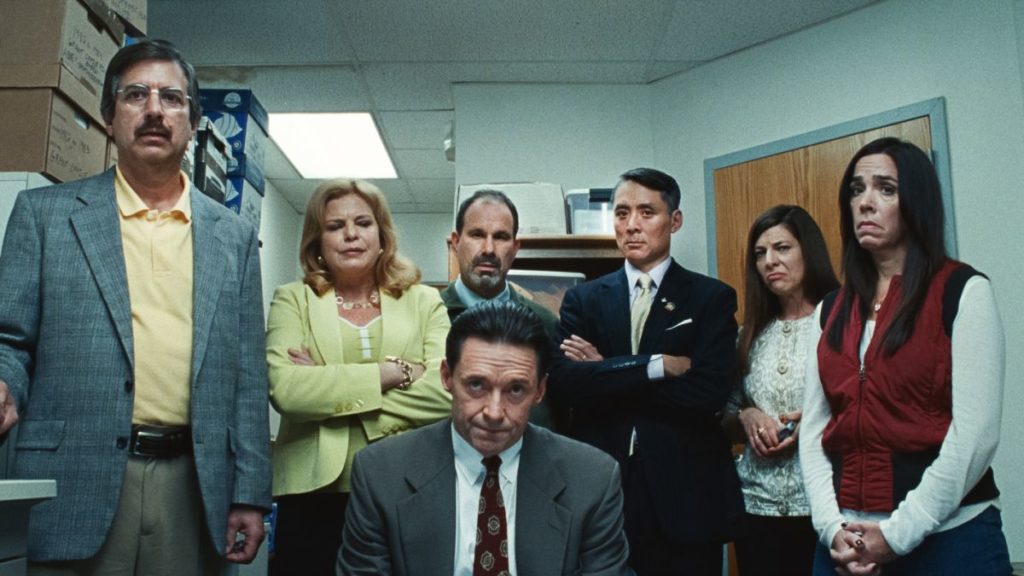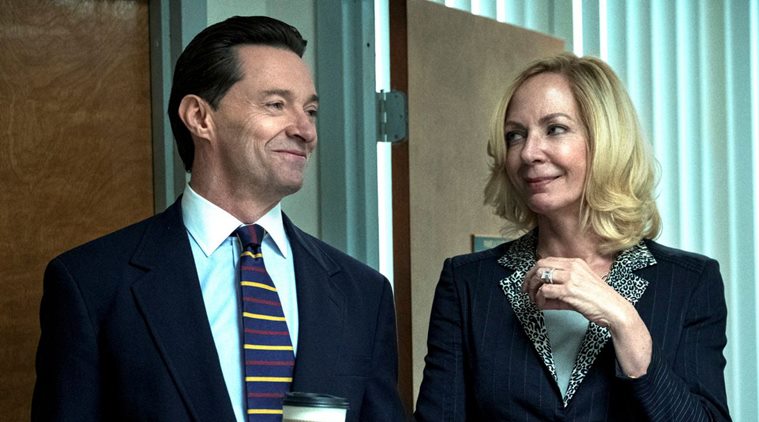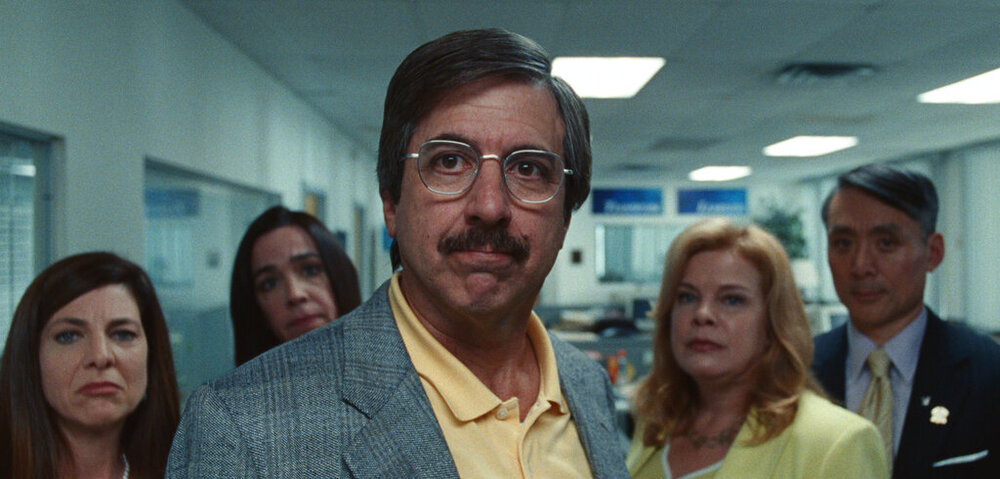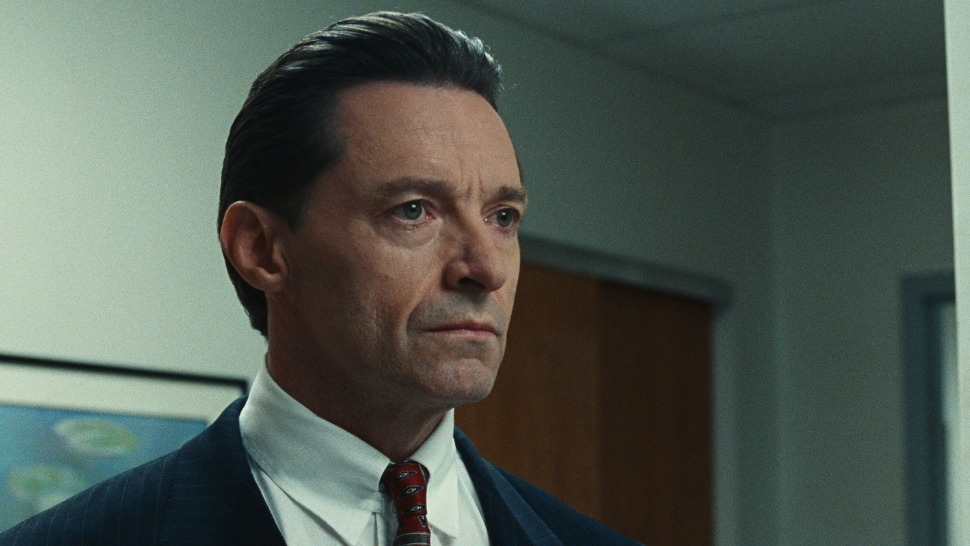
The lessons imparted in Bad Education aren’t typically taught in the classroom, but they’re nonetheless worth taking to heart. They include: Don’t give your corporate credit card to your no-account kids. Don’t schedule work trips to Las Vegas. And if you’re going to embezzle money from the school district that you run, do not—do not—encourage the student reporter writing a puff piece on your newest fancy expenditure to “dig deeper”.
The last of these nuggets of wisdom forms the linchpin of Bad Education, the spry and perceptive new movie from Cory Finley that’s currently streaming on HBO. An immensely promising young talent (he just turned 30), Finley’s debut feature was Thoroughbreds, an electrifying thriller about two teenage sociopaths who plot the murder of a loathsome stepfather. At first glance, his follow-up looks to be a dramatic departure; there are no off-screen stabbings, no portentous firearms, no dosed-up cocktails. But the two films do share a preoccupation with the falsehood of appearances: how conniving people construct polished exteriors in order to manipulate others. Finley’s characters tend to be sneakily more—and morally less—than what they seem.
The wolf in Brooks Brothers clothing here is Dr. Frank Tassone (a never-better Hugh Jackman), the superintendent of schools in Roslyn, a Long Island neighborhood whose cleanly paved streets are lined with spruce trees and handsome homes. With his surgically sculpted face and slicked-back, midnight hair, Tassone cuts an authoritative figure, but he initially presents as a white knight—an uncommonly noble and gracious bureaucrat whose savvy stewardship has lifted Roslyn to the fourth-ranked district in the country. So what if he’s stolen a few million bucks in the process?

I’m only half-joking. In telling the story of the embezzlement scandal that rocked Roslyn in 2002, Bad Education is both scrupulous and fascinating, a worthy entrant into the annals of white-collar cinematic crime. But its scariest insight lies in its depiction of communal blindness—of a collective willingness to ignore rampant criminality so as not to tarnish the district’s carefully manicured image of success. That’s why its most revealing scene comes relatively early, after the school board has stumbled upon the financial malfeasance of Pam Gluckin (Allison Janney, always good), the assistant superintendent who has racked up $250,000 in phony invoices and business expenses. Surveying a roomful of ruffled board members—a panicked mob eager for a scalp—Tassone puts his silver tongue to work. Is it really worth it, he asks with apparent earnestness, to publicize Gluckin’s poor judgment and subject their innocent students to the grave trickle-down effects? What happens once comptrollers start roaming their offices? What about Ivy League admissions? What about board elections? What about—gasp—real estate prices?
Bad Education is too effortlessly entertaining to be crudely polemical, but it nevertheless flings some pointed barbs at the pedagogy, which it conceives of as an institutional house of cards, built as much on facsimiles of intelligence and learning as on actual knowledge. What matters isn’t what you know but what others think of you, a delicate balance of pretense that indicts teachers, parents, and students alike. When that aforementioned reporter (Geraldine Viswanathan) pitches a story about Tassone’s corruption to the school paper, her editor blanches. “He’s writing my recommendation!”
That’s a funny line, and it typifies the undercurrent of bleak humor that runs through the movie. The screenplay, by Mike Makowsky—who attended Roslyn High in the wake of the scandal—is sharply detailed without feeling punctilious; bookend scenes of Tassone mollifying an obnoxious parent who’s making demands on behalf of her “gifted” young son efficiently conjure a social order obsessed with placement and status. Finley underlines this demented rigidity with quiet but inflexible control, most notably in his precise framing; a shot of Tassone seated in the center of a room, flanked by disapproving subordinates with crossed arms and creased frowns, is likely to become the film’s signature image.

With a trajectory that recalls The Informant! (one of this critic’s favorite Steven Soderbergh pictures), Bad Education is simultaneously suspenseful and inevitable; you know what’s ultimately going to happen, but you don’t quite know when, or how. Finley creates a vertiginous mood, envisioning Tassone as a nimble grifter dancing on the edge of a perpetually narrowing knife blade. The more brazen his lies and deceptions grow, the more quickly the walls close in. It’s an oddly satisfying experience, because it allows us to learn more of his true nature—to uncover the man behind the smiling, plastic mask.
As a based-in-fact drama, Bad Education is rigorous and compelling; it’s difficult to imagine this particular story being told on screen any better, or with a more expertly calibrated blend of energy and discernment. Yet there is an orderliness to it, a careful logic, that is weirdly deflating. One of the most exciting things about Thoroughbreds was its unpredictability, not just in terms of its plot but of its characters’ behavior. We were drawn to them because we’d never met anyone like them.
This movie is different. Its characters seem very much like regular people, which is a credit to its realism but which also limits its sense of mystery. That Finley wrings as much intrigue and pathos from a glorified check-fraud scam as he does is a testament to his skill, but his gifts are cabined by the prosaic nature of the material. There are only so many interesting ways to shoot interviews with dogged investigators, or to depict horrified educators slowly learning the truth about their sanctified leader.

Perhaps that’s why Bad Education, which shouldn’t be confused with the Almodóvar film of the same title, is most successful as a star vehicle. The supporting cast is uniformly good—Janney, in particular, relishes her role as an amoral viper—but it’s Jackman who provides the movie with its slippery complexity. Tassone is a total crook, and Jackman doesn’t shy away from highlighting his predatory tendencies. He’s also somewhat lonely, which explains why, even though he’s been secretly sharing a Park Avenue apartment with another man for 30-plus years, he embarks on an affair with a former student (Blindspotting’s Rafael Casal) whom he meets during one of his Vegas excursions. Yet while Jackman locates notes of isolation and longing in the character, he also astutely taps into a vein of simmering superiority, most memorably in a riveting scene where he fashions a parable about race cars to teach a child how to say the word “accelerate”. It’s a rich and nuanced performance, one that stealthily ensnares our sympathy even as it triggers our sense of self-righteousness.
If Jackman’s work feels like the capstone of a successful career, it’s also a reminder that his director is just getting started. Where does Cory Finley go from here? I’m excited to find out, even if I hope that he’s a bit more adventurous the next time around. After all, the classroom can be stifling, and he’s proved that he has nothing left to learn.
Grade: B
Jeremy Beck is the editor-in-chief of MovieManifesto. He watches more movies and television than he probably should.
